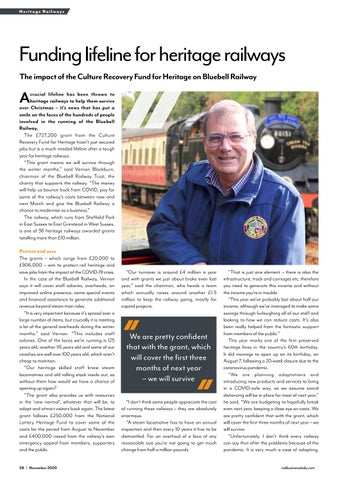Heritage Railways
Funding lifeline for heritage railways The impact of the Culture Recovery Fund for Heritage on Bluebell Railway
A
crucial lifeline has been thrown to heritage railways to help them survive over Christmas – it’s news that has put a smile on the faces of the hundreds of people involved in the running of the Bluebell Railway. The £727,200 grant from the Culture Recovery Fund for Heritage hasn’t just secured jobs but is a much needed lifeline after a tough year for heritage railways. “This grant means we will survive through the winter months,” said Vernon Blackburn, chairman of the Bluebell Railway Trust, the charity that supports the railway. “The money will help us bounce back from COVID, pay for some of the railway’s costs between now and next March and give the Bluebell Railway a chance to modernise as a business.” The railway, which runs from Sheffield Park in East Sussex to East Grinstead in West Sussex, is one of 36 heritage railways awarded grants totalling more than £10 million. Protect and save The grants – which range from £20,000 to £906,000 – aim to protect rail heritage and save jobs from the impact of the COVID-19 crisis. In the case of the Bluebell Railway, Vernon says it will cover staff salaries, overheads, an improved online presence, some special events and financial assistance to generate additional revenue beyond steam train rides. “It is very important because it’s spread over a large number of items, but crucially it is meeting a lot of the general overheads during the winter months,” said Vernon. “This includes staff salaries. One of the locos we’re running is 125 years old, another 115 years old and some of our coaches are well over 100 years old, which aren’t cheap to maintain. “Our heritage skilled staff know steam locomotives and old rolling stock inside out, so without them how would we have a chance of opening up again? “The grant also provides us with resources in the ‘new normal’, whatever that will be, to adapt and attract visitors back again. The latest grant follows £250,000 from the National Lottery Heritage Fund to cover some of the costs for the period from August to November and £400,000 raised from the railway’s own emergency appeal from members, supporters and the public. 58 | November 2020
“Our turnover is around £4 million a year and with grants we just about broke even last year,” said the chairman, who heads a team which annually raises around another £1.5 million to keep the railway going, mostly for capital projects.
We are pretty confident that with the grant, which will cover the first three months of next year – we will survive “I don’t think some people appreciate the cost of running these railways – they are absolutely enormous. “A steam locomotive has to have an annual inspection and then every 10 years it has to be dismantled. For an overhaul of a loco of any reasonable size you’re not going to get much change from half a million pounds.
“That is just one element – there is also the infrastructure, track and carriages etc, therefore you need to generate this income and without the income you’re in trouble. “This year we’ve probably lost about half our income, although we’ve managed to make some savings through furloughing all of our staff and looking to how we can reduce costs. It’s also been really helped from the fantastic support from members of the public.” This year marks one of the first preserved heritage lines in the country’s 60th birthday. It did manage to open up on its birthday, on August 7, following a 20-week closure due to the coronavirus pandemic. “We are planning adaptations and introducing new products and services to bring in a COVID-safe way, as we assume social distancing will be in place for most of next year,” he said, “We are budgeting to hopefully break even next year, keeping a close eye on costs. We are pretty confident that with the grant, which will cover the first three months of next year – we will survive. “Unfortunately, I don’t think every railway can say that after the problems because of the pandemic. It is very much a case of adapting, railbusinessdaily.com
